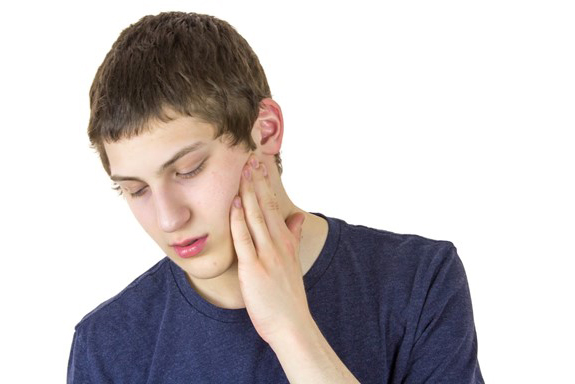 Teenagers stand at an awkward crossroads between childhood and adulthood, even though they technically still count as pediatric patients in the world of dentistry. As these youngsters encounter new stresses, peer pressure, and self-identity questions, the resulting behaviors can have unhappy effects on their dental and oral health.
Teenagers stand at an awkward crossroads between childhood and adulthood, even though they technically still count as pediatric patients in the world of dentistry. As these youngsters encounter new stresses, peer pressure, and self-identity questions, the resulting behaviors can have unhappy effects on their dental and oral health.
On the bright side, regular dental exams that uncover such problems may also help you identify which of these behaviors your teen has adopted, possibly without you ever noticing, giving you a chance to discuss them with your teen and seek outside help if necessary. Pay attention to the following potential dental red flags.
Teen Stress Can Promote Teeth Grinding
Adolescents often find that as they advance through the grades, so does their stress. Courses become more demanding, college entry exams loom in the near future, and social pressures mount. These stress factors can lead to an unconscious habit of teeth grinding, or bruxism, often at night while the affected teen sleeps.
Your pediatric dentist can easily see the signs of bruxism in your teen. Examples include flattened or worn-down chewing surfaces, gums that recede away from the teeth, indentations in the tongue, and worn enamel. The dentist may ask whether the teen experiences other symptoms such as jaw pain or headaches.
A teen who suffers from bruxism might need dental treatment to help correct the problem. Your dentist may also recommend counseling or other therapeutic techniques to help your teen better cope with stress, not just at this time of life but also throughout adulthood.
Adolescent Eating Disorders Cause Tooth Damage
Teens who suffer from self-image problems or other kinds of anxiety sometimes develop eating disorders. While girls account for 90 percent of teen eating disorder cases, boys can suffer from the problem as well if they feel unattractive or physically inadequate.
Common eating disorders include anorexia nervosa and bulimia nervosa. Teens who have anorexia nervosa often refuse food because they perceive themselves as fat. Teens who have bulimia can overeat and then vomit or use laxatives to eliminate the food before it can add unwanted pounds.
Even if your teen has managed to hide an eating disorder, a pediatric dental exam can reveal evidence of its effects on the teen's oral health. For instance, regular vomiting can cause unusual tooth erosion and an unexpected number of cavities. Bone loss related to anorexia may show up on dental X-rays.
Dry Mouth Symptoms and Stained Teeth Could Reveal a Hidden Smoking Habit
Far too many teens can fall into the trap of addiction to cigarettes and other tobacco products. A teen may feel pressure to look cool, mature, or fashionable, using a cigarette as a handy prop to support this image. Your teen may then take pains to hide this potentially deadly habit from you.
No matter how successfully a teen may hide a stash of tobacco products or the sight and smell of smoke, a dental exam may uncover the truth. Tobacco typically leaves yellow or brown stains on the teeth. It can also produce gum irritation and white patches in the oral cavity known as smoker's keratosis (a precancerous condition).
Unexplained Gum Disease Might Mean That Your Teen Should Quit Vaping
Both you and your teen might understandably regard vaping as a less harmful alternative to cigarette smoking or other traditional forms of tobacco use. Unfortunately, while vape products may not contain as many toxic chemical compounds as those other forms, they can still pose threats to your teen's oral wellness.
Nicotine, the addictive ingredient in cigarettes, represents a central ingredient in vape products as well. One of its primary effects on the body involves vasoconstriction, or the temporary narrowing of blood vessels. When gum tissue gets less nourishment from blood, it can grow more vulnerable to periodontal disease.
If your teen has both a vaping habit and the telltale signs of periodontal disease (which include bleeding or irritated gums, loose teeth, and bad breath), your pediatric dentist may recommend that the vaping stop. With luck, this change can help reverse gum disease in its early stages.
Swelling, Infections, and Enamel Loss Could Stem From Your Teen's Oral Piercing
Many teens receive oral piercings in an effort to follow current stylistic and social trends. Even if you gave approval for your teen to get a pierced cheek, tongue, or lip, you may want to talk your teen into canceling the procedure or removing the piercing once you understand how this kind of jewelry can affect oral wellness.
The human mouth serves as a nursery for millions of bacteria, many of them harmful. A piercing opens the tissues to these bacteria, allowing them to enter the bloodstream. Bacteria can also cause infection, pain, and swelling at the piercing site. Metal piercings can damage the teeth and promote receding gums.
Oral piercings can sometimes cause nerve damage as well as enamel or gum damage. For instance, a tongue piercing can cause permanent nerve dysfunction that reduces the sense of taste, interferes with tongue function, or leaves the tongue numb.
Dentistry for Children & Adolescents can point out any dental or oral health issues that may require treatment, including those that may reveal other health challenges you should address as a concerned parent. Contact our dental office to schedule a routine dental and oral examination for your teen.
